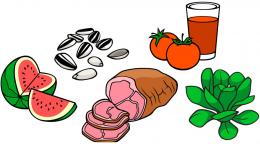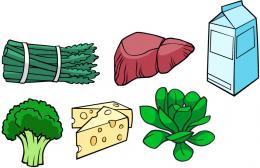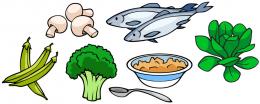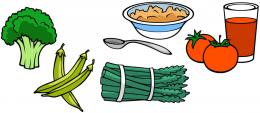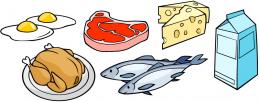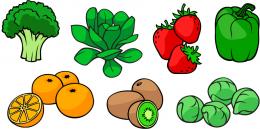Thiamin What it does: - helps convert the food we eat to the energy we need
Foods that have thiamin: - spinach, tomato juice, watermelon, sunflower seeds, ham
Deficiency problems: - weakness, tingling in feet and hands, poor coordination
| |
Riboflavin - named for its yellow color (flavus means yellow in Latin) What it does: - helps convert the food we eat to the energy we need
Foods that have riboflavin: - milk, cheese, liver, broccoli, asparagus, spinach
Deficiency problems: - eye disorders, cracks at corners of mouth, swollen tongue
| |
Niacin What it does: - helps our body use the fat and sugar we eat for energy
- helps keep our skin healthy
Foods that have niacin: - mushrooms, tuna, green beans, broccoli, spinach, breakfast cereals
Deficiency problems: - diarrhea, skin problems, mental disorientation
| |
Vitamin B6 What it does: - helps make red blood cells
- helps our body use the fat and protein we eat for energy
Foods that have vitamin B6: - spinach, broccoli, tomato juice, banana, watermelon, chicken breast
Deficiency problems: - headache, convulsions, vomiting, flaky skin, sore tongue
| |
Folate What it does: - helps to make new cells
- helps prevent heart disease
Foods that have folate: - asparagus, broccoli, corn flakes, green beans, tomato juice, beans
Deficiency problems: - diarrhea, mental disorders, poor growth
| |
Vitamin B12 What it does: Foods that have vitamin B12: - meat, fish, poultry, milk, cheese, eggs
Deficiency problems: - anemia, poor nerve function
| |
Biotin What it does: - helps you get energy from carbohydrate foods
- helps break down and use nutrients from food
Foods that have biotin: - most fresh vegetables, egg yolk, cereals, some breads
Deficiency problems: - tiredness, low appetite, anemia, vomiting, depression
|
|
Pantothenic acid
What it does: - helps you get energy from foods
- helps break down and use nutrients from food
Foods that have pantothenic acid: - whole grains, legumes, egg yolk, some meats, some vegetables
Deficiency problems: - rare but may include tiredness, anemia, vomiting, depression
|
|
Vitamin C- almost all animals make vitamin C in their bodies (only humans, guinea pigs, some bats, and some fish don't) What it does: - protects cells from damage
- helps keep bones and skin healthy
- may help prevent cancer and heart disease
Foods that have vitamin C: - oranges, strawberries, peppers, kiwi, brussel sprouts, broccoli, spinach
Deficiency problems: - bleeding gums, tiredness, weakness, sore muscles
| |








